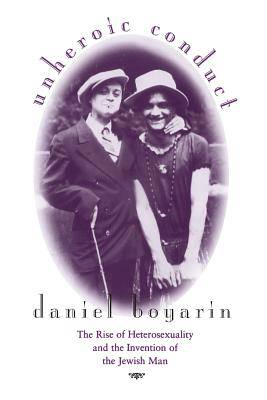
- Retrait gratuit dans votre magasin Club
- 7.000.000 titres dans notre catalogue
- Payer en toute sécurité
- Toujours un magasin près de chez vous
- Retrait gratuit dans votre magasin Club
- 7.000.0000 titres dans notre catalogue
- Payer en toute sécurité
- Toujours un magasin près de chez vous
Unheroic Conduct
The Rise of Heterosexuality and the Invention of the Jewish Man Volume 8
Daniel Boyarin
57,95 €
+ 115 points
Description
In a book that will both enlighten and provoke, Daniel Boyarin offers an alternative to the prevailing Euroamerican warrior/patriarch model of masculinity and recovers the Jewish ideal of the gentle, receptive male. The Western notion of the aggressive, sexually dominant male and the passive female reaches back through Freud to Roman times, but as Boyarin makes clear, such gender roles are not universal. Analyzing ancient and modern texts, he reveals early rabbis--studious, family-oriented--as exemplars of manhood and the prime objects of female desire in traditional Jewish society.
Challenging those who view the "feminized Jew" as a pathological product of the Diaspora or a figment of anti-Semitic imagination, Boyarin argues that the Diaspora produced valuable alternatives to the dominant cultures' overriding gender norms. He finds the origins of the rabbinic model of masculinity in the Talmud, and though unrelentingly critical of rabbinic society's oppressive aspects, he shows how it could provide greater happiness for women than the passive gentility required by bourgeois European standards.
Boyarin also analyzes the self-transformation of three iconic Viennese modern Jews: Sigmund Freud, the father of psychoanalysis; Theodor Herzl, the founder of Zionism; and Bertha Pappenheim (Anna O.), the first psychoanalytic patient and founder of Jewish feminism in Germany. Pappenheim is Boyarin's hero: it is she who provides him with a model for a militant feminist, anti-homophobic transformation of Orthodox Jewish society today.
Like his groundbreaking Carnal Israel, this book is talmudic scholarship in a whole new light, with a vitality that will command attention from readers in feminist studies, history of sexuality, Jewish culture, and the history of psychoanalysis.
Challenging those who view the "feminized Jew" as a pathological product of the Diaspora or a figment of anti-Semitic imagination, Boyarin argues that the Diaspora produced valuable alternatives to the dominant cultures' overriding gender norms. He finds the origins of the rabbinic model of masculinity in the Talmud, and though unrelentingly critical of rabbinic society's oppressive aspects, he shows how it could provide greater happiness for women than the passive gentility required by bourgeois European standards.
Boyarin also analyzes the self-transformation of three iconic Viennese modern Jews: Sigmund Freud, the father of psychoanalysis; Theodor Herzl, the founder of Zionism; and Bertha Pappenheim (Anna O.), the first psychoanalytic patient and founder of Jewish feminism in Germany. Pappenheim is Boyarin's hero: it is she who provides him with a model for a militant feminist, anti-homophobic transformation of Orthodox Jewish society today.
Like his groundbreaking Carnal Israel, this book is talmudic scholarship in a whole new light, with a vitality that will command attention from readers in feminist studies, history of sexuality, Jewish culture, and the history of psychoanalysis.
Spécifications
Parties prenantes
- Auteur(s) :
- Editeur:
Contenu
- Nombre de pages :
- 433
- Langue:
- Anglais
- Collection :
- Tome:
- n° 8
Caractéristiques
- EAN:
- 9780520210509
- Date de parution :
- 13-06-97
- Format:
- Livre broché
- Format numérique:
- Trade paperback (VS)
- Dimensions :
- 152 mm x 231 mm
- Poids :
- 571 g

Les avis
Nous publions uniquement les avis qui respectent les conditions requises. Consultez nos conditions pour les avis.






